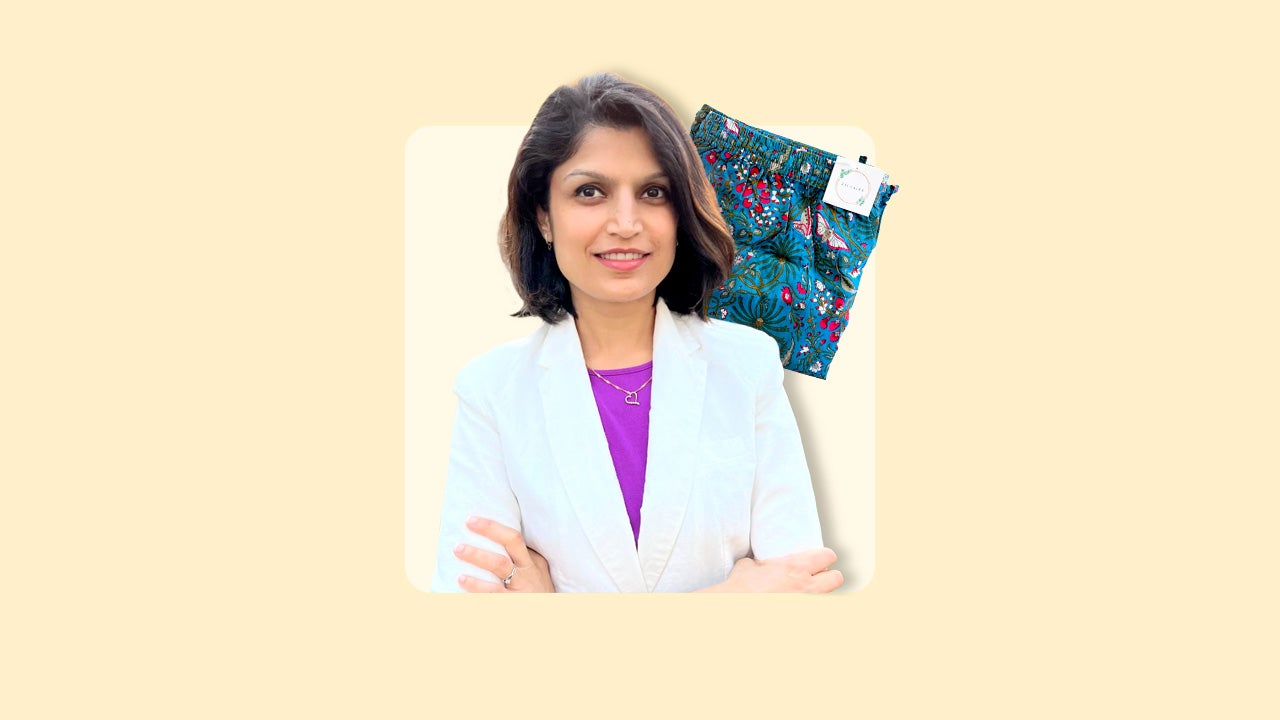Women-owned businesses continue to fuel the economy, representing nearly 40 percent of all businesses, employing 12.9 million workers and generating $3.3 trillion in revenue, according to the 2025 Wells Fargo Impact of Women-Owned Business Report.
Bankrate celebrates National Small Business Week by profiling Anandita Yadav, who immigrated to the U.S. from India in 2018 and, five years later, launched a small business.
Proof of concept
Yadav founded Zillajee, a company that makes sleepwear from premium cotton sourced in India, in 2023. “I grew up in India and I remember wearing cotton clothes all the time. [It was] my go-to fabric. Not just for me, but my family, friends and people around me. Cotton is really popular in India and is worn year round,” she says.
After moving to the U.S. in 2018, Yadav struggled to find the same kind of cotton she wore in India. “There’s a lot of items that are marketed as being 100 percent cotton, but they contain only a percentage of cotton and [are] mixed with other synthetic fabrics,” she says. “That triggered the idea for me to start my own business. I did some research. Being from India, I’m familiar with the areas where cotton is really popular, and I was able to source my products from India.”
Yadav focused on ethical production practices from the very start. “When I was looking for a vendor for my business, I wanted to make sure that their products are ethically produced,” she says. “I traveled to India [and] visited the factory where the products are made. I met with all the workers. They have a good number of women in their factory.”
It was also important to Yadav that employees had fair working conditions and were paid fairly. “Being a woman business owner and a woman of color, I do sometimes feel out of place in the retail sector,” she says. “There is [an] emphasis on diversity and inclusion, but a lot of it is just talking and not doing.”
Yadav started Zillajee with $500 of her own savings as a proof of concept, selling her goods on Etsy and her own website. “I saw the response that proved there was a gap in the market. Customers really love the prints,” she says. “I’ve had a lot of customers come back and tell me how they love this kind of cotton.”
Seeking help
At first, Yadav had many questions on starting a business. “I’m not from a business background. How do I start an LLC? [What is] tax filing? What licenses do I need? What kind of software do I need?” she asked. “So everything was learn-as-you-go, learn from your mistakes, keep pivoting and keep trying new things to see what works.”
“I wish there were more resources available to help me identify funding available for small women-led businesses,” says Yadav. “A lot of the time, all the stuff that I read online has to do with funding or investing in a business focused more on medium, large or tech businesses.”
Yadav went to the Small Business Administration (SBA) website and found a mentor through its nonprofit arm SCORE, a network of 10,000 volunteers who provide free small business mentoring, resources and education in all 50 states and territories. “[My mentor] has been great. She really helped me clearly define my business goals, the steps I’m going to take to get there and how to have a clear marketing strategy,” she says.
Yadav appreciated that her SCORE mentor, with whom she meets every six months or so, is also a woman. “She understands because my business has to do with women’s clothing, and she gets my product, its appeal and the customers that I’m trying to target,” she says.
Work-life balance
While Yadav would like to connect and network more with female business owners, her time is tight. “I have young kids at home, and I’m managing a business. So work-life balance is really important to me,” she says.
These are really precious years, says Yadav. “I want to be able to enjoy every moment of it. But my business is also my passion and there is so much creativity inside of me,” she says. “My business is what helps me channel that creativity, so it’s also really important to me. It gives me a lot of satisfaction and joy. So to be able to balance both of those I found really helps.”
Every day, Yadav writes a list of things she needs to accomplish for the next day. “But I also try to be flexible. [There are] always unplanned things that pop up, so I have to be accommodating,” she says. “Taking time out for myself has been a conscious effort for me. Otherwise, the stress would just get to me.”
Funding the business
Zillajee is currently a side hustle for Yadav. “I haven’t reached a point where it would compensate for my full-time job. So it’s a side hustle for me that I’m trying to grow,” she says. “I’m in my forties. I have responsibilities, so I can’t just quit my job and focus on a side hustle. I’m not in a place in my life where I can do that.”
To scale her business, however, Yadav needs funding. “I’m a small business [making] under six figures. It’s been a year and a half since I started my business,” she says. “I’m now looking for micro resources. I feel like most resources are not geared towards micro-businesses or solopreneurs. I wish there were more resources available for marketing, creative branding and business operations, such as legal and finance.”
Having capital infused into Zillajee would help take it to the next level, says Yadav, though she is also looking into grants available for women with small businesses. “I haven’t had any outside funding or loan up until now,” she says. She applied for SCORE’s 60th Anniversary Pitch Competition but didn’t win.
“It was an amazing experience just to be able to prepare for that,” Yadav says. “It gives you a bird’s eye view of your business and how you would present your business to an outsider,” she says.
Facing challenges
The Trump Administration’s reciprocal tariffs on India and countries around the world represent a growing challenge to Zillajee. India’s current tariff rate is 26 percent, according to the White House, but like other countries, has been on a 90-day pause that ends on July 8, 2025.
Despite this, Yadav has already seen import and shipping costs from India rise. “As a small business, we’ve tried to absorb as much of the increase as we can, but we’ve also had to slightly increase our prices,” she says. “We pride ourselves in offering quality clothing at accessible prices so it was a tough call to make but one that had to be made in order for our business to be sustainable.”
In February 2025, Yadav increased her prices by an average of 20 percent. “This helped offset increased material and shipping costs, while continuing to prioritize quality and ethical production,” she says, adding that she believes it’s important for her business to have accessible price points so that more women can buy from Zillajee.
The bottom line
Looking ahead to the next five to 10 years, Yadav sees the opportunity to expand to multiple new markets. “In 2024, we quadrupled our sales volume without any external funding. Customers love the distinctive, fresh look of the prints and the all-cotton products,” she says. “In 2025, I’m focused on continuing that momentum with more product offerings and an expanding customer base. We have inclusive sizing, [including] plus and tall size options. I’m trying to slowly increase the range of sizes we offer, so I’m able to reach as many women as possible and make them feel special.”
Yadav’s passion for prints, especially the florals that are Zillajee’s signature style, has her looking toward growth in the loungewear market as well. “My long-term vision is [to become] the go-to brand for cotton clothing in the U.S. I would like to expand and offer products for men and children,” she says. “I feel there are so many other categories that we could expand to be able to offer different options in terms of size, patterns and designs,” she says.
“I’ve tried to ensure that my pricing is accessible. A lot of the time I would [hear] people say, ‘Oh, you know, I do want to buy sustainable clothing, but it’s just so expensive I couldn’t afford it,’” she says. “But with my brand, there is an option where it’s sustainable, but it’s also affordable.”
Check out Bankrate’s Small Business Week Guide for more resources.
Read the full article here
















